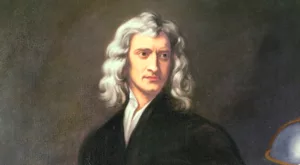 Sir Isaac Newton was an English mathematician, physicist, and astronomer who is widely considered one of the greatest scientists of all time. Born on January 4, 1643, in Woolsthorpe, Lincolnshire, England, he died in Kensington, London, England, on March 31, 1727.
Sir Isaac Newton was an English mathematician, physicist, and astronomer who is widely considered one of the greatest scientists of all time. Born on January 4, 1643, in Woolsthorpe, Lincolnshire, England, he died in Kensington, London, England, on March 31, 1727.
Among Newton’s most famous works is his book “Mathematical Principles of Natural Philosophy” in 1687, which describes the laws of motion and gravitation. One of the most important scientific works in history, this work revolutionized the way scientists understood the physical universe.
As well as his contributions to physics, Newton also made significant contributions to mathematics, including the development of calculus. In addition to studying optics, he conducted experiments with light, which led to the creation of the first reflecting telescope.
In 1705, Queen Anne knighted Newton for his contributions to science. His work continues to influence modern physics and mathematics, making him one of the greatest scientists in history.
Legacy: Sir Isaac Newton
Newton is considered one of the most influential and significant figures in science history for several reasons:
-
Laws of motion: Objects in motion behave according to Newton’s laws of motion, which he published in his book “Mathematical Principles of Natural Philosophy.” Newton’s laws remain some of the most important scientific principles of all time.
-
Theory of gravitation: Newton’s theory of gravitation, which states that all objects in the universe are attracted to one another by their masses, was a groundbreaking idea that explained the movements of planets and other celestial bodies. Today, this theory is used to study the universe and led to a new understanding of the universe.
-
Calculus: Newton also contributed to the development of calculus, a branch of mathematics that deals with rates of change and motion. Newton laid the foundation for calculus, which has countless applications in science, engineering, economics, and other fields.
-
Optics: He developed the first reflecting telescope as a result of his experiments with light and optics, which led to our modern understanding of light and how it behaves.
-
Scientific method: Newton’s rigorous approach to scientific inquiry, which included formulating hypotheses and testing them through experiments and observations, helped establish the modern scientific method. Scientists have used this method to advance our understanding of nature ever since.
A wide range of fields continue to be influenced by Isaac Newton’s ideas, whose ideas had a profound impact on the development of science and mathematics.
Impact Today
There are several ways in which Isaac Newton’s works have impacted today’s world:
-
Science and technology advances: Newton’s laws of motion and theory of gravitation led to modern physics and space exploration. Telescopes, microscopes, and cameras were developed as a result of his work in optics.
-
Development of calculus: In fields such as engineering, economics, and computer science, Newton developed calculus independently of Gottfried Wilhelm Leibniz. For developing models of complex systems and predicting their behavior, it is essential.
-
Influence on scientific method: Newton’s rigorous approach to scientific inquiry has influenced the modern scientific method. To draw conclusions, hypotheses must be formulated, experiments must be conducted, and data must be analyzed.
-
Impact on philosophy and theology: As a result of Newton’s ideas, traditional views of the universe and human existence were challenged. Mechanics has influenced philosophy and theology through his work on natural laws and motion.
-
Cultural influence: Newton is considered one of the greatest scientists in history and has become an icon in popular culture. Inspire generations of scientists and thinkers with his image and ideas.
From scientific advancements to cultural influences, Newton’s works continue to shape and inspire the modern world.
Final Days
Newton died on March 31, 1727, in Kensington, London, England, at the age of 84. His death was caused by a number of factors, including a perforation of his gastric ulcer, which resulted in peritonitis (inflammation of the abdominal wall), and a number of other health problems, including gallstones, kidney stones, and an enlarged prostate. As his health deteriorated, Newton continued to pursue his scientific and mathematical interests. Upon his death, he was buried in Westminster Abbey, London, with great honors.












